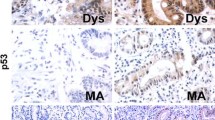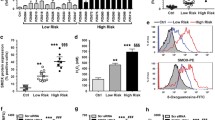Abstract
Background
H. pylori (Hp) infection is a major risk factor in gastric carcinogenesis leading to epithelial mutagenesis, and may affect gastric epithelial stem cells.
Aims
To characterize the expression of Lgr5, a marker of epithelial stem cells in human gastric mucosa, to determine whether Hp infection affects Lgr5-positive epithelial cells (LPECs) and whether LPECs are susceptible to DNA damage associated with Hp infection.
Methods
Lgr5 expression was characterized in non-neoplastic gastric mucosa from 52 patients (34 with and 18 without gastric cancer (GC); 21 Hp-positive (Hp+) and 31 Hp-negative (Hp−)) by immunohistochemical and immunofluorescence staining. To determine the extent of DNA damage in LPECs, nuclear 8-hydroxydeoxyguanosine (8OHdG), a marker of DNA damage associated with oxidative stress, was measured by quantitative spectral image analysis.
Results
LPECs were primarily present in gastric antrum. Higher numbers of LPECs were seen in Hp+ than in Hp− non-neoplastic mucosa of GC patients, P = .006, but not in patients without GC. 8OHdG levels in LPECs were significantly higher than in Lgr5-negative epithelial cells in Hp+ GC patients (P = .012) but not in Hp− cases (P = .414), whereas no difference was seen between Hp+ and Hp− mucosa of patients without GC.
Conclusions
The Lgr5-positive epithelial stem cell pool is expanded in Hp-associated gastritis in the antrum of patients with GC. In GC patients with active Hp infection, LPECs may be more susceptible to DNA damage than Lgr5-negative epithelial cells, suggesting that Hp infection may contribute to GC risk by affecting epithelial stem cells in the human stomach.




Similar content being viewed by others
References
Warren JR, Marshall B. Unidentified curved bacilli on gastric epithelium in active chronic gastritis. Lancet. 1983;1:1273–1275.
Marshall BJ. Helicobacter pylori: the etiologic agent for peptic ulcer. JAMA. 1995;274:1064–1066.
Kimura K. Gastritis and gastric cancer. Asia. Gastroenterol Clin North Am. 2000;29:609–621.
Dixon MF, Genta RM, Yardley JH, Correa P. Classification and grading of gastritis. The updated Sydney system. International workshop on the histopathology of gastritis, Houston 1994. Am J Surg Pathol. 1996;20:1161–1181.
Herrera V, Parsonnet J. Helicobacter pylori and gastric adenocarcinoma. Clin Microbiol Infect. 2009;15:971–976.
Ferlay J, Shin HR, Bray F, Forman D, Mathers C, Parkin DM. Estimates of worldwide burden of cancer in 2008: GLOBOCAN 2008. Int J Cancer. 2010;127:2893–2917.
Kim JJ, Tao H, Carloni E, Leung WK, Graham DY, Sepulveda AR. Helicobacter pylori impairs DNA mismatch repair in gastric epithelial cells. Gastroenterology. 2002;123:542–553.
Yao Y, Tao H, Park DI, Sepulveda JL, Sepulveda AR. Demonstration and characterization of mutations induced by Helicobacter pylori organisms in gastric epithelial cells. Helicobacter. 2006;11:272–286.
Sepulveda AR, Yao Y, Yan W, et al. CpG methylation and reduced expression of O6-methylguanine DNA methyltransferase is associated with Helicobacter pylori infection. Gastroenterology. 2010;138:1836–1844.
Qiao XT, Gumucio DL. Current molecular markers for gastric progenitor cells and gastric cancer stem cells. J Gastroenterol. 2011;46:855–865.
Barker N, Huch M, Kujala P, et al. Lgr5(+ve) stem cells drive self-renewal in the stomach and build long-lived gastric units in vitro. Cell Stem Cell. 2010;6:25–36.
Simon E, Petke D, Boger C, et al. The spatial distribution of LGR5+ cells correlates with gastric cancer progression. PLoS ONE. 2012;7:e35486.
Barker N, van Es JH, Kuipers J, et al. Identification of stem cells in small intestine and colon by marker gene Lgr5. Nature. 2007;449:1003–1007.
Becker L, Huang Q, Mashimo H. Immunostaining of Lgr5, an intestinal stem cell marker, in normal and premalignant human gastrointestinal tissue. Sci World J. 2008;8:1168–1176.
Farinati F, Cardin R, Degan P, et al. Oxidative DNA damage accumulation in gastric carcinogenesis. Gut. 1998;42:351–356.
Hahm KB, Lee KJ, Choi SY, et al. Possibility of chemoprevention by the eradication of Helicobacter pylori: oxidative DNA damage and apoptosis in H. pylori infection. Am J Gastroenterol. 1997;92:1853–1857.
Kuchino Y, Mori F, Kasai H, et al. Misreading of DNA templates containing 8-hydroxydeoxyguanosine at the modified base and at adjacent residues. Nature. 1987;327:77–79.
Barker N, Clevers H. Leucine-rich repeat-containing G-protein-coupled receptors as markers of adult stem cells. Gastroenterology. 2010;138:1681–1696.
Yao Y, Tao H, Kim JJ, et al. Alterations of DNA mismatch repair proteins and microsatellite instability levels in gastric cancer cell lines. Lab Invest. 2004;84:915–922.
Yoshizawa K, Jelezcova E, Brown AR, et al. Gastrointestinal hyperplasia with altered expression of DNA polymerase beta. PLoS ONE. 2009;4:e6493.
Houghton J, Stoicov C, Nomura S, et al. Gastric cancer originating from bone marrow-derived cells. Science. 2004;306:1568–1571.
Correa P, Houghton J. Carcinogenesis of Helicobacter pylori. Gastroenterology. 2007;133:659–672.
Mills JC, Shivdasani RA. Gastric epithelial stem cells. Gastroenterology. 2011;140:412–424.
Correa P. Human gastric carcinogenesis: a multistep and multifactorial process—First American Cancer Society Award Lecture on Cancer Epidemiology and Prevention. Cancer Res. 1992;52:6735–6740.
Gologan A, Graham DY, Sepulveda AR. Molecular markers in Helicobacter pylori-associated gastric carcinogenesis. Clin Lab Med. 2005;25:197–222.
Farinati F, Cardin R, Russo VM, Busatto G, Franco M, Rugge M. Helicobacter pylori CagA status, mucosal oxidative damage and gastritis phenotype: a potential pathway to cancer? Helicobacter. 2003;8:227–234.
Sepulveda AR, Goyal A. Helicobacter pylori and Gastric Neoplasms In: Tan, D. & Lauwers, GY, eds. Advances in Surgical Pathology: Gastric Cancer. Philadelphia, PA: Lippincott Williams and Wilkins; 2011:22–37.
Takeda K, Kinoshita I, Shimizu Y, Matsuno Y, Shichinohe T, Dosaka-Akita H. Expression of LGR5, an intestinal stem cell marker, during each stage of colorectal tumorigenesis. Anticancer Res. 2011;31:263–270.
Conflict of interest
None.
Author information
Authors and Affiliations
Corresponding author
Electronic supplementary material
Below are the links to the electronic supplementary material.
Rights and permissions
About this article
Cite this article
Uehara, T., Ma, D., Yao, Y. et al. H. pylori Infection Is Associated with DNA Damage of Lgr5-Positive Epithelial Stem Cells in the Stomach of Patients with Gastric Cancer. Dig Dis Sci 58, 140–149 (2013). https://doi.org/10.1007/s10620-012-2360-8
Received:
Accepted:
Published:
Issue Date:
DOI: https://doi.org/10.1007/s10620-012-2360-8




